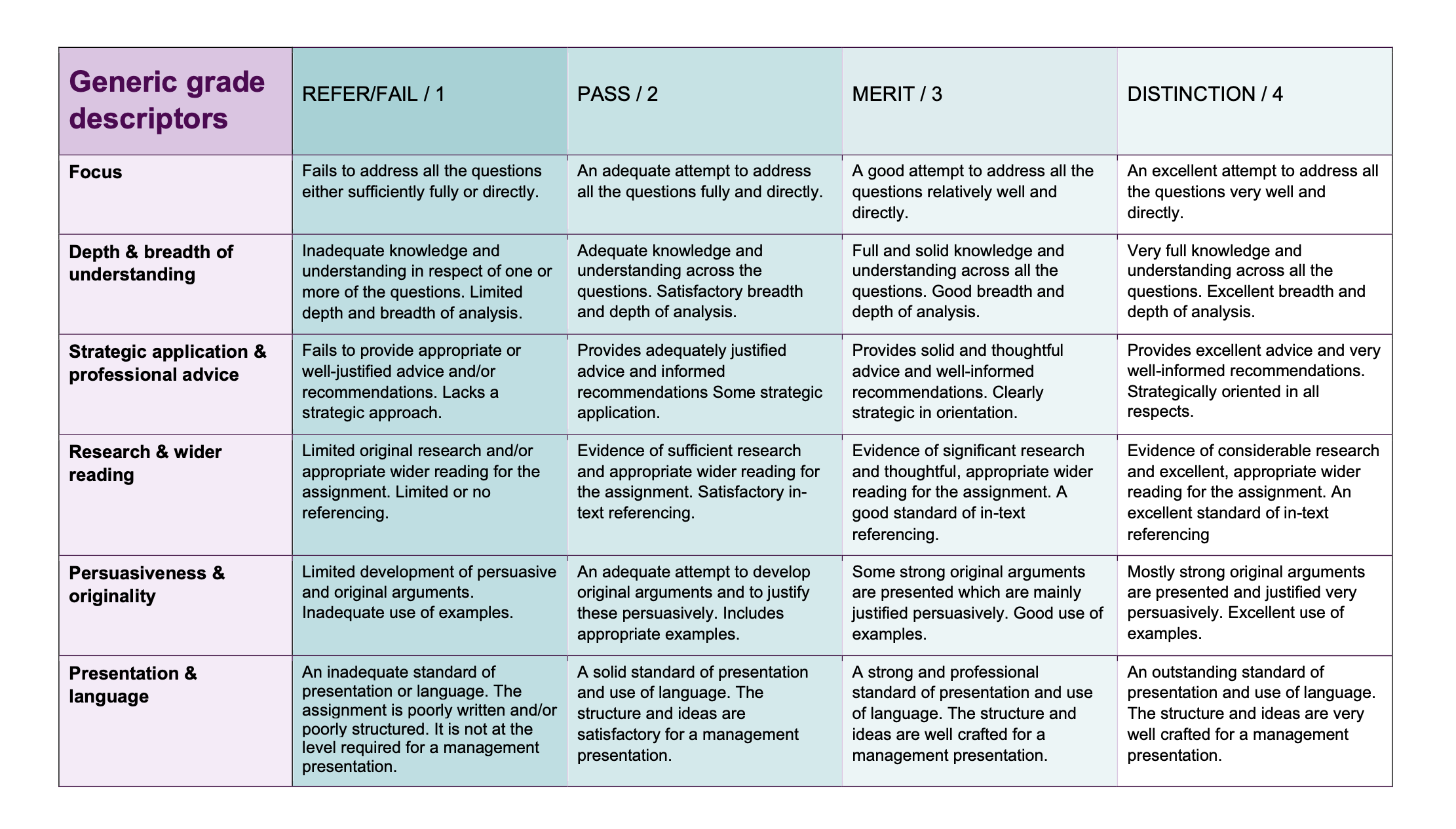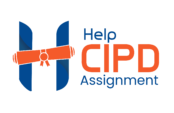

CIPD Level 7 Past Papers
Table of contents, 7hr02 resourcing and talent management to sustain success.
Assessment Questions
In recent months, the UK has seen record levels of job vacancies across a variety of sectors. Recent CIPD research has found that, three-quarters of UK employers are reporting hard–to–fill vacancies, whilst globally, it is reported that employers are heading for a talent shortage perfect storm, attributed to the ‘Great Resignation’, remnants of the pandemic, low levels of unemployment and an increasing need for new skills.
Attracting and retaining talent is becoming increasingly difficult, and as a result has moved further up the people management agenda, as organisations struggle to remain competitive.
In response to this situation, you recognise the need to review your organisation’s resourcing and talent strategy (for the purpose of this assessment you can either focus on your own organisation or one with which you are familiar). To achieve this, you need to address the following:
Question 1 (AC 1.4)
Critically evaluate your organisation’s employer brand and make recommendations on how this can be improved to ensure a more compelling employee value proposition is offered, securing an enhanced reputation for the organisation in the labour market.
Question 2 (AC 2.3)
Critically analyse how technologies can be utilised to improve employee selection, drawing upon examples to illustrate.
Question 3 (AC 3.3 )
Recommend two interventions that could be designed to improve the retention of staff, justifying why they are appropriate to your organisation.
Question 4 (AC 4.1)
Drawing upon research evidence, provide a justified argument for the adoption of collaborative as opposed to punitive approaches to managing and enhancing employee performance.
Marking Grid
Learners will receive a Pass, Merit, Distinction or Refer/Fail result at unit level.
Assessors must provide a mark from 1 to 4 for each Learning Outcome in the unit. Assessors should use the generic grade descriptor grid as guidance so they can provide comprehensive feedback that is developmental for learners. Please be aware that not all of the generic grade descriptors will be present in every learning outcome for all the assignments, so assessors must use their discretion in making grading decisions.
To pass the unit assessment learners must achieve a 2 (Pass) or above for each of the learning outcomes.
The overall mark achieved will dictate the Grade the learner receives for the Unit, provided NONE of the learning outcomes have been failed or referred. A detailed marking grid will be released once the 4 questions are published.
7CO03 Personal Effectiveness, Ethics Business Acumen

CIPD Level 7 Assignment Examples From The CIPD Experts

- May 25, 2024
- 4 Mins Read
Education lays the groundwork for society, shaping future generations’ viewpoints and paths. But like any complex system, our educational framework is a flexible system that changes over time to meet the demands of a constantly shifting environment. In fact, to properly evaluate the nuances of this structure, we must scrutinize its merits, flaws, and capacity for change
Assignments at CIPD Level 7 are more than simply tests; they’re doors to a better understanding and proficiency with HR procedures. These projects usually involve strategic frameworks, real-world scenarios, and intricate HR concepts. In fact, they test students’ ability to assess, analyze, and recommend solutions that meet ethical standards and corporate objectives.
The Value of Excellent Assignment Samples
Students can use model assignments as a guide when they are negotiating the complexities of CIPD Level 7 curriculum.
These illustrations have several advantages:
Clarity of Expectations: Students get a clear idea of the degree of analysis, critical thinking, and research depth required at CIPD Level 7. They get this idea by looking at excellent examples of assignments.
Application of Theory to Practice : CIPD specialists provide examples of how HR theories are applied in business practice. The HR theories act as a tool to bridge the knowledge gap between academics and organizations.
Improved Learning Experience: By offering real-world knowledge, fresh viewpoints, and industry-tested HR experts’ best practices, analyzing well written assignments improves the learning process.
Developing Confidence: Learning from excellent assignments gives students the confidence they need to take on challenging HR problems with assurance and expertise.
CIPD Level 7 Assignment Examples: Revealed
Let’s examine a few perfect examples that come from understanding CIPD Level 7 assignments examples . Moreover, they show the depth and scope of the knowledge that students have demonstrated:
Strategic HRM Analysis, as an example
Assignment: Analyze an organization’s HR procedures strategically and make suggestions for improving its edge over competitors.
Important components:
Thorough SWOT analysis assessing possibilities and threats from the outside as well as internal strengths and weaknesses.
An analysis of the organization’s present HR initiatives in relation to its corporate goals.
With a focus on sustainability and innovation, I suggest strategic approaches that are backed by academic research and industry best practices.
Example 2: Initiative for Leadership Development
Task: Create a leadership development program for an international company with the goal of promoting an inclusive and innovative culture.
Important components :
Through needs analysis, we identify gaps in the organization’s present culture and leadership abilities, and develop solutions for leadership development. These solutions cater to various organizational structures and demographics.
Implementation strategy detailing the distribution of resources, the schedule, and the measures for assessment to guarantee program efficacy.
The provided text describes an assignment to review and examine the findings from an employee engagement study. The goal is to use quantitative and qualitative techniques to uncover patterns and links in the data. Moreover, key factors that motivate and demotivate workers should be pinpointed using statistical proof. Actually, employees should create solutions that directly address specific problems and frustrations, while also leveraging their strengths and goals.
This assignment example demonstrates the proficiency and dedication of CIPD professionals. Their expertise in human resource management, combined with real-world practice, enriches the learning process for HR students. The professionals’ commitment to superior quality assists developing HR experts on their path to capability and triumph in their vocations. In fact, by providing excellent examples, they guide students toward mastery and success.
Accepting Lifelong Learning
The path to excellence in the ever-changing field of human resource management takes place well outside of traditional academic settings. CIPD Level 7 assignments examples not only act as standards for academic success but also kindle a desire for professional growth and lifetime learning.
Developing Critical Thinking
Examining model assignments develops critical thinking abilities necessary for negotiating the complexity of contemporary HR issues. Through the examination of leadership efforts, employee engagement interventions, and strategic analyses, learners acquire the skill of discernment in identifying root causes, developing empirically supported remedies, and projecting future trends.
Encouraging Cooperation and Creativity
In the HR community, excellent assignment examples ignite and foster a collaborative and innovative culture. Actually, students participate in debates, exchange ideas, and confront preconceptions, adding to a body of knowledge that promotes ongoing development and thought leadership in the industry.
Developing Moral Leadership
Exemplary assignments stress the value of ethical leadership in HR procedures in addition to emphasizing strategic acumen. Learners refine their ethical reasoning abilities by looking at CIPD level 7 assignment examples case studies and ethical conundrums included in assignments.
The CIPD Level 7 curriculum is a challenging course, and for aspiring HR professionals, having access to excellent assignment examples is essential to developing their professional values and character. Gaining a deeper understanding of HR concepts, a commitment to quality work, and a network of mentors and colleagues to lean on, they become champions for employee empowerment and change agents inside organizations.
Finally, while negotiating the complexities of CIPD Level 7 assignments might seem intimidating, learners gain essential insights and the confidence to succeed when they follow the guidance supplied by CIPD Experts in the form of excellent assignment examples. Moreover, these illustrations not only show the path to academic success but also serve as role models for future HR directors, influencing the direction of workplace wellness and organizational excellence.
Table of Contents
Leave a Reply Cancel reply
Your email address will not be published. Required fields are marked *
Save my name, email, and website in this browser for the next time I comment.
Does the CIPD Level help to find a job?
What to do when bored in class.
Payment Method Easily Can Be:

Copyright © 2024 All Right Reserved (CipdExperts.co.uk)
- WordPress.org
- Documentation
- Learn WordPress
- Always Online
- +44 2871140060

- CIPD Level 3 Course
- CIPD Level 5
- CIPD Level 7 Courses
- ILM Assignment Help
- CMI Assignment Help
7os06 Assignment Example
- November 2, 2023
- Posted by: admin
- Category: CIPD Level 7

Assessment activity 1 for CIPD Level 7 Optional Module 6: Critically Evaluate The Key Theories And Definitions Related To Wellbeing At Work.
People go to work every day, but did you realise that it may also be one of the most significant aspects of their lives? Positive psychology studies how employees feel about their workplace or company culture (corporate social responsibility); P-E fit, which means having a suitable balance between personal time spent outside of working hours vs the total number of hours worked each week. When we understand psychological contracts that companies may have built up based on what they need from people with different personality types: hardiness vs resilience, we’ll dig deeper into all of these topics.
Assignment Activity 2 of the CIPD Level 7 Optional Module 6 is: Why Workplace Wellbeing Is Important to Employers and Employees.
Well-being has a strong commercial case. Employees in good physical and mental health have been demonstrated to be more productive than their less healthy counterparts, resulting in enhanced efficiency within a business. In addition, however, there is a positive influence on employee morale when employees are engaged at work and are healthier due to a more inclusive culture with lower absenteeism and presenteeism rates (inability-to-work). Finally, promoting organisational health improves long-term viability, which every business wants these days.
Assessment activity 3 for CIPD Level 7 Optional Module 6: Examine Organizations’ Responsibilities to Engage in Workplace Wellbeing.
Employers are required by law to have a duty of care for their employees, but they must also consider concerns such as corporate social responsibility and reputation. When looking at stakeholder interests in recruiting new hires or retaining current staff members, meeting minimum health/safety standards with an emphasis on minimising workplace injuries through education programs about what’s appropriate behaviour under different circumstances will provide the best results, so there aren’t any negligence suits filed against your business later down the road because someone acted negligently.
Assessment activity 4 in CIPD Level 7 Optional Module 6 examines the impact of individual and group factors on well-being at work.
Stress, shiftwork, social support systems in the office and lack of sleep are all factors that might impair your mental health at work. These pressures often lead to increased levels of anxiety, which causes an individual’s moods to change over time as a result of this continuous cycle affecting them physically as well as mentally, leading to depression or even full-blown illnesses like arthritis if left unchecked long enough for things not to get better soon enough with treatment options available today through medication prescribed by doctors if you need help coping and staying healthy.
For students interested in pursuing this course, there are a variety of publications available. Here are a few examples that institutions across the globe extensively utilise.
Afsar, B., & Umrani, W. A. (2019). Transformational leadership and innovative work behavior: The role of motivation to learn, task complexity and innovation climate. European Journal of Innovation Management .
Dhiman, S. (Ed.). (2021). The Routledge companion to mindfulness at work . Routledge, Taylor & Francis Group.
Foster, D. (2018). The health and well-being at work agenda: good news for (disabled) workers or just a capital idea? Work, employment and society , 32 (1), 186-197.
Harvey, G. (2019). Corporate wellness: what, why not, and whither? Employee Relations: The International Journal .
Hesketh, I., & Cooper, C. (2019). Well-being at work: how to design, implement and evaluate an effective strategy . Kogan Page Publishers.
Manokha, I. (2020). The implications of digital employee monitoring and people analytics for power relations in the workplace. Surveillance & Society , 18 (4), 540-554.
Marques, J. (Ed.). (2020). The Routledge Companion to Happiness at Work . Routledge.
Mitchell, D. (2018). 50 Top Tools for Employee Wellbeing: A Complete Toolkit for Developing Happy, Healthy, Productive and Engaged Employees . Kogan Page Publishers.
Newstead, T., Macklin, R., Dawkins, S., & Martin, A. (2018). What is virtue? Advancing the conceptualisation of virtue to inform positive organisational inquiry. Academy of Management Perspectives , 32 (4), 443-457.
Timms, P. (2021). Transformational HR: How human resources can create value and impact business strategy . Kogan Page Publishers.
Related Articles:
- CIPD Level 7
- 7OS06 WELL-BEING AT WORK


Tips for Excelling in CIPD Level 7 Assignments

- Posted by by admin
- 4 weeks ago
Well, CIPD has never been easier, and we know that CIPD level 7 is the hardest of them all. But if you are really passionate about HR. And want to elevate your career, Right? Then this is the most incredible choice that you have. Not only it will give you an edge over other HR professionals. However, CIPD level 7 will make you an ideal choice for leading HR positions in your company, too. So, it is worth the risk.
Table of Contents
The Challenge of CIPD Level 7 Assignments
You know the biggest nightmare for CIPD level 7 students that blocks their way to their success is the complex assignments of this level. These assignments are not like any ordinary assignments but are much more complicated and require lots of focus and expertise on this subject. But do not worry, I have a list of some amazing tips that will help you excel in these assignments without any worries. So, let us take a look at these tips to help you outshine others and ace your assignments .
Tips to Ace CIPD Level 7 Assignments
1. understand the assignment requirements.
Well, the requirements of your assignments are the roadmap to your assignment journey. They tell you what to do and how to do it. So, you had better give them enough time to understand them clearly. Because if you read it wrongly, then you might start your journey in the wrong direction. Which will not only waste your valuable time but also risk your grades. So, always read your requirements clearly first and make sure that you clearly know about the following:
- Type of Assignment
- Any other special instructions (Like Referencing)
2. Conduct Thorough Research
You know, research is the soul of any assignment. In the CIPD level 7, you must conduct deep research to find the most relevant information. Well, this level is not like the basic level 3 of CIPD. But it is the most advanced one. So, you have to really go deeper into your research and dig out the most relevant facts to include. Here are some really significant points that you should keep in mind:
- Always explore different resources and do not rely on just one source for information.
- Use authentic sites only to ensure the reliability of the content.
- Note down the sources of your information
- Only add relevant information to your assignments.
- You can use keywords to streamline your research for better results.
3. Develop a Strong Argument
Well, what is the point of writing a CIPD assignment without any valid argument? So, try to develop a strong argument for your assignments. It will give a purpose to your assignments and will make it much more interesting for you than before.
4. Plan Your Time Effectively
So, the biggest problem while writing your CIPD assignments is managing your time effectively. And trust me, if you learn to do that. Everything will get under control. You must have heard time is money. Well, that is absolutely correct. So, here is what you can do to manage your time effectively:
- Prioritize your tasks
- Break down complex tasks into manageable ones
- Create a Schedule
- Keep an eye on your deadline
- Set goals for yourself
5. Write Clearly and Concisely
You must know that you are writing your assignment and not a novel. So, you must avoid using difficult words and terms in your assignments. Well, your professors are not going to be impressed by your vocabulary but your knowledge and the quality of your work. So, try to keep things simple and precise in your assignments.
6. Stick to the Word count
Well, if you think that just by prolonging your assignments, you can impress your professors. Then, you are wrong, my friend. The quantity does not matter in CIPD assignments, but the quality does. In fact, there is a specific word count for each level of CIPD assignment. And if you write anything more or less than that, then it might result in a loss of your grades. So, you really need to be careful here. Make sure that your content is relevant and matches the desired word count of your assignments.
7. Seek Assistance when Needed
Now, let me tell you about an amazing shortcut to your CIPD Level 7 assignments. There are lots of professional CIPD Level 7 Assignment Help in UK . I know that is exciting and trust me there is no shame in asking for their help. As long as you are not completely depending on them all the time. So, take their assistance at the right time and make sure that you do not miss your deadlines again.
8. Reference Correctly
The originality of your CIPD level 7 assignments is the key to your success. And I am sure that you do not want to play with that one here. As it might even ruin your whole efforts. So, to ensure originality, you must add proper citations and references in your assignments. Just make sure that you are doing it as per the required style by your professors. And save your assignments from any kind of plagiarism.
9. Edit and Proofread
Once you are done with your assignments, do not just rush to submit them. In fact, you must read them multiple times to check if there are any mistakes or errors. Obviously, when we are writing in a flow, we do not take care of these small things. But they are really important. And you must proofread your assignments in the end to ensure that everything is good to go.
10. Use Technology
We are living in the digital era. And technology has made our lives much easier. You know you can even use it to save a lot of your time when writing assignments. There are various online tools and apps that can help you reference, proofread, and even format your assignments. And we know that these tasks are quite time-consuming. So, you can save a lot of your time through this.
11. Stay Motivated
Do not let stress and anxiety take over your nerves. I know these assignments are hard but trust me, they are not impossible. You just need a little push of motivation to keep you going. So, whenever you feel a rush of adrenaline, and want to give up. Start thinking about the benefits of your CIPD qualification. This will help you keep motivated and focused on your studies.
12. Utilize CIPD Resources
Well, you might not know but CIPD resources are like a treasure for CIPD students. You really need to explore the library of your CIPD institute to find the best books and journals. And the best part is that all of them are linked to CIPD. So, if you are not finding the right information for your assignments. Then this is the place where you will surely get some relevant information to add to your assignments.
Final Words
I know that writing a CIPD level 7 Assignment might be the biggest challenge of your life. But with these tips, you have the power to ace them. These assignments seem hard because they require a great amount of focus and time. And I already told you how you can effectively manage that. So, once you learn to do that, things will get much easier for you. So, follow these tips, and I know these assignments will not remain as much challenging for you as they are for you now. Remember, your journey might be challenging, but the reward in the end is really worth it. So, Best of luck, students!
Post navigation

5 Essential Tips to Excel in CIPD Level 5 Assignments

Tips for Writing Effective CIPD Assignments
Leave a comment, leave a reply cancel reply.
Your email address will not be published. Required fields are marked *
Save my name, email, and website in this browser for the next time I comment.
You may also like

7 Tips To Easily Manage Your University Assignments
- February 19, 2024

Taking the Pulse of the People Profession in Ireland
- March 8, 2023

What Does CIPD Give You?
- April 3, 2024

A Detailed Guide to Writing Top-Notch University Assignments: Secrets Unveiled!
- February 13, 2024

- Tutoring Coming Soon
5OS07 Assignment Example
- September 2, 2022
- Posted by: Harry King
- Category: CIPD Level 5

Task One – Briefing paper for the senior leadership team
Ac 1.1 evaluation of 2 issues and theories of wellbeing including their relevance in the workplace.
PERMA Theory of Well-Being
PERMA theory of well-being explains the five major components of well-being. The term PERMA, used in theory, represents positive emotion, engagement, relationships, meaning and accomplishment. According to Martin Seligman who developed the theory, individuals must achieve the aforementioned five components to experience a healthy sense of well-being, satisfaction in life and find one’s true meaning (CFI Team, 2022). As defined in theory, positive emotion entails feeling good, savouring physical pleasures and being hopeful and optimistic about the future. On the other hand, engagement defines the experience in which an individual is physically, emotionally and mentally committed to deploying their skills, strengths and attention to fulfilling a specific task. The theory also defines relationships as essential in pursuing happiness and well-being. According to the theory, individuals seek to experience a sense of belonging, love, and attention from a specific group, including co-workers, friends and peers.
The fourth element of happiness and well-being, as defined by the theory, is meaning. For individuals to experience a sense of well-being, they must derive meaning and purpose from the activities that they engage in. The last element of happiness and well-being is an accomplishment that includes a sense of achievement, success and competence.
There are several merits and limitations of the PERMA model of well-being. When applied in the workplace, it can support the building of better relationships and improve the performance of employees. Besides, it can help prevent burnout among employees and identify key areas of their well-being that should be supported. Nevertheless, the theory has been criticised for identifying building blocks of well-being but failing to recommend how they can be implemented. Furthermore, physical well-being is neglected in theory.
Centeredness Theory (CT)
Centeredness Theory (CT) uses a systems approach to self-actualisation to explain how individuals can achieve higher well-being. According to the theory, individuals’ well-being is affected by different aspects of their lives, including their selves, work, family, relationships and community (Bloch-Jorgensen, Cilione, Yeung and Gatt, 2018). This theory may be used in the workplace to support individuals in establishing a balance between intrinsic self-generated goals and exogenous domains. Skills that can lead to improved well-being include being mindful and reflective, reframing stress and cultivating awareness.
The advantage of the theory is that, at its core, it emphasises the need to maximise pleasure and reduce pain to improve well-being. Similarly, the theory identifies five domains that one could use to drive well-being: family, relationships, work and community. Nevertheless, it is important to point out that the theory uses a psychological approach and disregards the physical aspects of employee well-being. These may include hygiene, work-life balance, physical activities and diet.
Challenges at Orchard Group
Orchard Group is experiencing the problem of high absenteeism. Employee absenteeism refers to the habitual absence of employees from work. Employee absenteeism has negative impacts on workplace productivity. In particular, frontline employees who are absent at Orchard Group imply that numerous processes in the organisation may stall. This also contributes to poor services and customer dissatisfaction. Similarly, assigning extra work to remain employees due to absences can decrease their motivation and performance. The leading causes of employee absenteeism are poor well-being with leading factors including family relayed issues, illnesses and stress.
High turnover at Orchard Group is a major concern. Numerous studies, including one by Holliday (2022), posit that the ideal employee turnover in organisations is 10%. Nevertheless, Orchard Group has over 33% in employee turnover. A high turnover in the organisation has several disadvantages, for example, it leads to the loss of talented staff, an increase in recruitment costs and disruption of a succession plan and organisational culture. Factors such as work environment, social relationships, job meaningless, and recognition which impact well-being, can be causes of turnover in the organisation.
AC 1.2 How employee well-being can be managed to support organisational goals
Employee well-being relates to different aspects of an individual’s work-life, including their job, relationships, colleagues, work culture and expectations. It also defines the organisation’s responsibility to ensure employees are supported to improve their financial, social, emotional, environmental, mental, and physical wellness.
Employee well-being initiatives could be used to increase organisational performance at Orchard Group. Employee well-being is intrinsically linked to performance. As a result, higher employee well-being results in higher productivity. Orchard Group could identify personal challenges that employee face and which affect their performance at work and provide employee assistance programs. An employee assistance program that focuses on legal assistance, elder care services, health insurance, financial advice, and support can help alleviate employee stress, depression, and substance abuse, making them more productive at work.
Employee well-being programs may also be used to reduce the cost of recruitment and selection. The high turnover in the organisation implies that Orchard Group must conduct fresh recruitments, selection and training of new employees. With recruitment exercises being capital intensive, the Orchard Group must minimise costs that may reduce the organisation’s overall profitability. This may be achieved through a retention strategy such as implementing a training and career advancement opportunities. These opportunities communicate to workers that the organisation invests and cares about their personal and professional development which improves loyalty and organisational commitment and encourages retention.
AC 1.3 Benefits of employee well-being practices in organisation
Motivation’
Employee well-being initiatives are integral in promoting positive experiences, as described through the PERMA model of well-being. People professionals should design jobs that meet the skills, qualifications and capabilities of employees. This ensures they are engaged in their jobs and find a sense of meaning and purpose. It also translates to improved motivation, organisational citizenship and discretionary behaviours.
Reduced employee absenteeism rates
Well-being initiatives that could be implemented at Orchard Group may include offering employees’ manageable workloads and opportunities for flexible working schedules. This is crucial in ensuring employees do not experience burnout, balance their work responsibilities, and still take care of their personal and familial responsibilities. It also improves their physical, social and emotional health, reducing absenteeism rates.
Reduces turnover
Using PERMA Theory, people practice professionals can implement employee well-being initiatives to reduce the rate of turnover. For instance, Orchard Group could promote positive emotions in the organisation through the organisation’s culture. People practice professionals should inculcate a culture of respect, collaboration, gratitude and togetherness (CFI Team, 2022). Employee well-being initiatives such as training and development programs allow employees to develop a sense of belonging and loyalty and reduce their likelihood of leaving.
Attraction of talent
Employee well-being may improve the organisation’s branding in the labour market and enhance efforts to attract qualified staff at lower costs (Cemazar, 2020). Employees are attracted to organisations where they will feel valued and respected. An organisation implementing well-being initiatives executes a culture of respect and inclusivity which attracts qualified talent.
Improves productivity
Implementing assistance programs by Orchard Group to support employees in addressing personal, financial, and emotional challenges would help reduce employee-related stress, illnesses and absenteeism which are hindrances to optimal employee performance. According to Morris (2022), employee well-being leads to a happier, satisfied workforce that is likely to deploy their skills, attention and strength in discharging their duties and enhances their creativity and innovation.
Centeredness Theory can be utilised to assess the benefits of well-being initiatives at Orchard Group. The theory recommends that employees should be supported in the five domains of their lives, self, relationships, community, work and family. Nevertheless, its only limitation is the failure to consider the personal factors that influence well-being. However, PERMA Theory, on the other hand, introduces the concept of positive emotions and work-life balance, which addresses the limitations of the Centeredness Theory.
Task Two – Review of organisational practice
Section one, ac 2.3 external and internal factors impacting orchard group including three areas the organisation should focus on..
Training and career development
Training and development significantly affect employee well-being. Employees who lack the relevant skills and competencies to do their job are likely to experience job dissatisfaction. In addition, employees unable to advance their careers perceive stagnation and are likely to experience poor well-being and be disengaged from work.
Recognition
Employee recognition refers to the appreciation and acknowledgement extended to employees by employers for their contributions to the organisation (Reba, 2019). Recognition impacts how employees perceive themselves and their overall well-being since it influences positive emotions. For example, recognition allows employees to experience a sense of meaningfulness in their job. It also makes them feel valued in the organisation, which increases engagement.
People practice professionals are responsible for advocating for good people practices in an organisation that accommodates employee needs and contributes to achieving organisational goals. The work employees are allocated determines whether they experience work-life balance (Bloch-Jorgensen, Cilione, Yeung and Gatt, 2018).. Employees who are overworked and work long hours have a poor work-life balance, while those with flexible schedules have good health and well-being,
Financial security
Employees who are poorly compensated and have no health or retirement plan experience a sense of financial insecurity. This can contribute to stress, depression and anxiety, which contributes to poor well-being. Besides, financial insecurity can be a cause of distraction for employees at orchard Group, thus leading to poor performance.
Three Top areas of well-being that Orchard Group should focus on
The physical well-being of employees
Physical well-being refers to being safe, in good health, and a balanced state of body and mind. Physical well-being transcends being free from illnesses and includes adopting healthy lifestyle choices. Orchard needs to promote the physical well-being of its employees. This is because it is associated with higher concentration levels, stigma performance and reduced stress. In addition, physical health is associated with a reduced number of sick days which would help in addressing the high absenteeism rates.
Financial wellness of employees
Financial well-being is where individuals can fully address their current and ongoing financial responsibilities. In addition, individuals with financial wellness feel secure about their future and have the flexibility to make choices that improve their happiness. Studies by Albrecht (2022) indicate that financial responsibilities are among the leading causes of employee stress and anxiety. Providing opportunities for employees to experience financial security can ensure Orchard Group employees alleviate stress and can focus more. Studies show that employees who receive financial support through pension plans and pay raises are 15 times more engaged (Albrecht, 2022). Besides, they feel happier, cared for and valued by the organisation, which improves motivation and loyalty.
Social wellness
Social wellness/well-being refers to the sense of inclusivity, belonging, and alignment with organisational values and the social interactions and relationships employees have in the workplace. Employees’ social interactions and relationships also impact their emotional, physical and mental health. For instance, good social relationships with co-workers inculcate a sense of belonging and become a source of social support. Furthermore, social well-being encompasses forming strong relationships that improve collaboration and camaraderie. It also positively impacts employee loyalty and retention as employees attach psychological value to their work. Studies by mayo clinic have also shown that social wellness helps in reducing stress, depression and high blood pressure (vintage fit, 2022).
AC 2.2 How well-being can be integrated with other areas of people’s practice
Social well-being
Social well-being can be integrated into other areas of people’s practices, such as human resource policy. For instance, Orchard Group could enlist the support of experts and professionals to design human resource policies that support employee diversity and inclusion in an organisation (Cookman and Young Whyte, 2020). This may include diversifying talent pools during recruitments and developing a culture where respect, justice, teamwork and collaboration are encouraged. Furthermore, social wellness can be improved by developing channels that employees can use to share their voices and contribute to different issues in the workplace. In addition, campaigns for raising awareness n how employees can cope with change and uncertainties, as well as counselling services, can help build institutional resilience necessary to support employees’ social well-being.
Physical well-being
Physical well-being can be integrated into other people’s practices, such as job design, health, and safety. For instance, job design can reduce high-pressure working environment that aggravates the risk of employees developing stress, burnout, and ergonomic challenges that cause poor well-being and performance (Cookman and Young Whyte, 2020). Through job design, Jobs at Orchard Group can be designed to ensure employees work within the limits of working time regulations. Furthermore, job design can be leveraged to pride work-life balance through flexible work arrangements. Jobs can be designed to focus on outcomes rather than processes. As a result, employees can work when they feel most productive.
Furthermore, health and safety can impact employee well-being. Employees working in dirty working environments with poorly maintained equipment aggravate the risk of workplace-related accidents and affect employee morale. Regular risk assessments should be conducted in the workplace, and regular maintenance carried out. Employees should also be trained on workplace safety, thus reducing the probability of accidents.
Financial well-being
Financial well-being may in integrated with reward practices at Orchard Group. To ensure employees have a sense of financial security, the organisation should regularly review employee pay and benefits and adjust them based on governed regulations, market rates and prevailing economic situations. In addition, financial benefits could be tied with performance through performance-based rewards. This ensures that as employees benefit from better pay and rewards, the organisation’s productivity also increases. Furthermore, Orchard Group could implement employee financial assistance programs where the employees are offered advice on financial decisions.
Section 2 – Value of well-being initiatives
Ac 3.1 value existing organisational practices and whether they add value to achieving organisational needs..
Financial well-being improves employee performance and retention .
Financial well-being implemented in the organisation through reward programs can help improve employee performance and promote retention. According to Maslow’s hierarchy of needs, financial security under safety needs is a significant source of motivation for employees (Mcleod, 2022). Employees are more likely to perform better at work when they experience financial security and are happier in their jobs if they can freely make financial decisions and enjoy life. Similarly, the equity theory of motivation emphasises that employees are more satisfied and perform better at work when they receive rewards proportional to their contributions. As a result, providing reward opportunities such as better pay and reward bonus, retirement plans, and job security improves job satisfaction and motivation and encourages retention.
Physical well-being in reducing absenteeism
Promoting physical well-being at Orchard Group is an effective intervention to the high rates of employee absenteeism recorded. Employees with poor physical well-being are more likely to experience chronic illnesses such as heart disease and high blood pressure, and mental health challenges such as anxiety and depression (White, 2022). Nevertheless, by designing jobs that allow employees to experience work-life balance, employees experience better health outcomes which translate to better workplace productivity and decreased reports of absenteeism due to illnesses.
Social well-being enhancing resourcing decisions
Social well-being in the organisation has a direct implication on its resourcing decisions. Social wellness is crucial when building healthy, supportive relationships with others. In addition, creating a workplace that values inclusion and diversity enhances collaboration and fosters the development of positive working relationships (White, 2022). In addition, social wellness challenges and gym memberships offered to employees allow employees to participate in activities that improve their health while bonding together. The aforementioned ensures employees develop a sense of belonging among team members and loyalty towards the organisation, encouraging retention behaviour. Similarly, a positive work environment where employees feel supported can position Orchard Group as an employer of choice, making it easier to attract the best talents in the market to occupy critical roles.
AC 3.2 Recommendation of three well-being initiatives and their implementation plan
Social wellness activity: peer-to-peer commendation
Peer-to-peer recognition, also referred to as social recognition, is a form of employee empowerment and acknowledgement of another’s performance at work (Cody, 2021). Orchard Group should make it a practice for employees to send social recognition to their peers in various forms, including emails and written messages. This should also be incorporated into the organisational culture to enhance competitiveness and collaboration and encourage a positive and inclusive workplace.
Resources required
This activity requires no financial support from the organisation. Nevertheless, it will be important to identify individuals to lead the initiatives. Such individuals include line managers, team leaders, and human resource professionals who will raise awareness and encourage employees to acknowledge other people’s work.
Justification for selecting the initiative
Studies emphasise the relevance of social recognition programs in improving the social well-being of employees in the organisation. According to Lovett (2021), social recognition helps build stronger bonds among employees, reduces stress, boosts employee confidence and establishes psychological safety across the organisation. It also improves job satisfaction and promotes retention. For example, a study by LinkedIn shows that employees who are recognised for their work have a retention rate of 96% (Lovett, 2021).
Timescale for delivery
Employees will acknowledge each other’s work every quarter.
Physical wellness activity: Flexible working hours
Flexible working arrangements refer to alternative forms of arrangements away from the traditional work week. (Talentlyft, 2022) In the traditional working day and week, employees must physically appear at work for five days between 9 am and 5 pm. On the other hand, with a flexible schedule, employees are allowed to start and finish their workday as preferred. As a result, employees can come to work early and leave earlier.
Implementation of the activity requires financial and policy support. For example, organisational design professionals must be engaged to ensure the flexible work policy does not compromise the quality of work provided or lower customer satisfaction.
A flexible working policy allows employees to balance their work and personal responsibilities. As a result, they experience less stress, burnout and health complications, improving their performance. In addition, the initiative improves employee job satisfaction by providing them control over time and promotes retention (Talentlyft, 2022). Furthermore, flexible working schedules are becoming increasingly important to job seekers. As a result, employers offering this initiative can attract the best talent.
The activity will be implemented from November 2022 after stakeholder involvement.
Financial wellness activity: Pension Plan
The activity is the form of a pension plan where the employer, on behalf of the employee, makes regular (monthly) contributions to a pension fund for use when eligible for retirement.
The required resources to implement the activity entail paying 3% of employees’ qualifying earnings to the pension scheme and optional employer contributions and ensuring the funds are remitted monthly.
Studies by Ahmed, Abayomi and Nureni (2016) confirm that pension plans directly correlate with employees’ financial security. Employees with a pension feel less secure about their future financial security and are more likely to be more focused and committed at work than those without a pension plan. Similarly, a pension plan positively impacts employee morale and organisational commitment. Employees with a pension plan are more motivated at work, loyal to the organisation, and less likely to leave.
The activity will be implemented in December 2022 following stakeholder consultation.
Section 3 – Implementation and evaluation of well-being initiatives
Ac 3.3 steps required to ensure successful implementation of well-being programme.
Assessing activity concerning management and stakeholder expectation
Before implementing the activities, it is important to ensure that it is in line with the management expectations and stakeholders’ interests. As a consequence, project managers should seek the support of the managers and leaders by informing them of the nature of the activity and how its benefits employees and the organisation. Besides, by engaging managers and leaders, a project manager can request information or other assistance required to make the project successful. From the case study, the project manager can explain to senior leaders and managers how physical, social and financial wellness can help to address high absenteeism, turnover and poor performance.
Communication and justification of programme
The project manager should communicate to employees to scope and benefits of the physical, social and psychological wellness initiatives (McGurgan, 2022). For instance, the project manager could explain that the flexible working initiative could enhance employees’ physical wellness and improve job satisfaction. The project manager could also emphasise that the social recognition program will foster the growth of healthy relationships at work and collaboration and ensure individuals have a source of social support. Besides, the pension plan will improve financial security. One- on one conversation with employees who are reluctant to embrace the activity could also help in establishing buy-in. Furthermore, schedules for implementation of the program, including those responsible for implementation, should then be identified and communicated.
Gathering of feedback
Professionals should seek feedback from employees regarding wellness initiatives. For more accurate data, the activities could be tested in select departments, and employees and managers requested to share their experiences. Furthermore, focus groups, one-on-one conversations and satisfaction surveys could be used to gather feedback. This is crucial in ensuring employee interests are catered for, and problems are identified early.
Adoption and evaluation of the initiative
The last stage is the adoption and implementation of the initiatives (McGurgan, 2022). Evaluation is then done where reports outlining how it performed agent projected targets, budget and timelines. Applicable data on areas that should be improved in the future should be identified.
AC 2.1 Steps to support stakeholder contribution and how this can impact well-being at work.
Involving key stakeholders when implementing wellness initiatives is important in ensuring their success (McGurgan, 2022). It ensures that the initiative to be implemented reflects the needs and priorities of employees, improves accountability, promotes transparency and increases ownership by the stakeholders. There are several stakeholders that should be engaged when implementing the initiatives; these include organisational leaders, line managers, finance professionals, and organisational design professionals.
Line managers are important stakeholders who should be engaged by organising focus groups to determine the merits of the activities and how to implement the. Line managers have a good understanding of employee needs and preferences in charge of employee management. In addition, they have invaluable information on how to improve employee motivation and reduce resistance.
Organisation design professionals should also be engaged. Organisational design professionals are stakeholders responsible for designing roles, processes and structures developed to achieve organisational goals and objectives. They will be engaged to offer advice and direct the process of creating new flexible working schedules.
Employees, who will be the prime beneficiaries of the activities, will also be engaged through employee engagement surveys, team meetings, interviews and focus groups. Employees will offer their insights and opinions and how the projects will be customised to satisfy their needs and preferences.
AC 3.4 How well-being initiative can be evaluated and monitored
Engagement surveys and performance monitoring will be used to evaluate the pension plan. Engagement surveys open the line of communication in the organisation and enable the gathering of honest feedback that can give insights into new problems and solutions. Employee engagement surveys measure how m engaged and motivated employees are in the organisation. Positive feedback on employee motivation and satisfaction with work and organisation processes will indicate success.
Absenteeism length and rate- will be used to evaluate the effectiveness of the flexible working policy. The flexible working policy helps improve employees’ physical health, including eradicating stress, fatigue and work-related anxiety. Absenteeism is an effective indicator of the health of the workforce, a high absenteeism rate will indicate failure of the activity. A decrease in the current absenteeism rate at Orchard Group will indicate the activity’s success.
Staff turnover will be used to evaluate the effectiveness of the employee social recognition program and the pension plan. A key benefit of measuring turnover is that it is a reliable indicator of the dynamism and vitality of organisational policies (Vulpen, 2022). A decrease in turnover from the current 33% will be a success, while an increase will indicate failure. A pension plan and social recognition program improve job satisfaction and organisational commitment and create a positive work environment. Employees also develop a sense of belonging and loyalty hence retention.
Ahmed, I., Abayomi, O. and Nureni, S., 2016. Effects of contributory pension scheme on employees productivity: Evidence from Lagos state government. African Journal of Business Management , 10(16), pp.384-396. Available at: <https://academicjournals.org/journal/AJBM/article-full-text-pdf/E42E85160216> [Accessed 2 September 2022].
Albrecht, H., 2022. 4 Reasons financial wellness is important in the workplace . [online] Limeade. Available at: <https://www.limeade.com/company/newsroom/4-reasons-financial-wellness-is-important-in-the-workplace/#:~:text=Financial%20wellness%20improves%20engagement.&text=They%20may%20alleviate%20stress%20and,individuals%2C%20inspiring%20loyalty%20and%20motivation.> [Accessed 2 September 2022].
Bloch-Jorgensen, Z., Cilione, P., Yeung, W. and Gatt, J., 2018. Centeredness Theory: Understanding and Measuring Well-Being Across Core Life Domains. Frontiers in Psychology , 9. Available at: <https://pubmed.ncbi.nlm.nih.gov/29765344/> [Accessed 1 September 2022]
Cemazar, S., 2020. Employee Wellbeing in the Workplace: Importance and Future Predictions . [online] Semos Cloud. Available at: <https://semoscloud.com/blog/employee-wellbeing/> [Accessed 2 September 2022].
CFI Team, 2022. PERMA Model . [online] Corporate Finance Institute. Available at: <https://corporatefinanceinstitute.com/resources/careers/soft-skills/perma-model/> [Accessed 2 September 2022].
Cody, 2021. Why Is Peer-to-Peer Recognition Important? [4 Reasons Why] . [online] Matterapp.com. Available at: <https://matterapp.com/blog/why-is-peer-recognition-important> [Accessed 2 September 2022].
Cookman, A. and Young Whyte, G., 2020. Integrating Individual and Organizational Well-Being (SSIR) . [online] Ssir.org. Available at: <https://ssir.org/articles/entry/integrating_individual_and_organizational_well_being> [Accessed 2 September 2022].
Holliday, M., 2022. Why Employees Quit & How to Keep Them . [online] Oracle NetSuite. Available at: <https://www.netsuite.com/portal/resource/articles/human-resources/employee-turnover-statistics.shtml#:~:text=What%20is%20a%20good%20employee,them%20due%20to%20poor%20performance.> [Accessed 2 September 2022].
Lovett, M., 2021. Back to Basics: What Is Social Recognition? . [online] Workhuman.com. Available at: <https://www.workhuman.com/resources/globoforce-blog/back-to-basics-what-is-social-recognition> [Accessed 2 September 2022].
McGurgan, H., 2022. Steps for Implementing a New Program at Work . [online] Small Business – Chron.com. Available at: <https://smallbusiness.chron.com/steps-implementing-new-program-work-80057.html> [Accessed 2 September 2022].
Mcleod, S., 2022. [Maslow’s Hierarchy of Needs] . [online] Simply Psychology. Available at: <https://www.simplypsychology.org/maslow.html> [Accessed 2 September 2022].
Morris, A., 2022. 5 Steps to Reduce Absenteeism . [online] Davidsonmorris.com. Available at: <https://www.davidsonmorris.com/reduce-absenteeism/> [Accessed 2 September 2022].
Reba, 2019. How recognition impacts brain chemicals and has a lasting impact on employee wellbeing . [online] Reba.global. Available at: <https://reba.global/resource/the-impact-of-recognition-on-wellbeing.html> [Accessed 2 September 2022].
Talentlyft, 2022. What is Flexible working hours? . [online] Recruiting and Hiring Resources. Available at: <https://www.talentlyft.com/en/resources/what-is-flexible-working-hours> [Accessed 2 September 2022].
vantagefit, 2022. Social Wellness: A Determining Factor For Employee Wellness At Work . [online] Blog.vantagefit.io. Available at: <https://blog.vantagefit.io/what-is-social-wellness/> [Accessed 2 September 2022].
Vulpen, E., 2022. Absenteeism Rate Explained | Formula & Meaning of Absence Rate – AIHR . [online] AIHR. Available at: <https://www.aihr.com/blog/absenteeism-rate/#:~:text=The%20absenteeism%20rate%2C%20absence%20rate,the%20vitality%20of%20the%20organization.> [Accessed 2 September 2022].
White, M., 2022. Why Physical Wellness Matters at Work and How to Promote it With Employees . [online] Blog.accessperks.com. Available at: <https://blog.accessperks.com/why-physical-wellness-matters-at-work-and-how-to-promote-it-with-employees> [Accessed 2 September 2022].
Email:- [email protected] Whatsapp:- +1-646-948-8918

Level 7 CIPD Assignment Samples
The Level 7 CIPD assignment is an advanced level assignment for human resource professionals who are looking to develop their strategic thinking and leadership skills. The Level 7 CIPD assignment focuses on various aspects of human resource management, such as talent management, employee relations, performance management, and organizational development. The purpose of this assignment is to enable HR professionals to apply their theoretical knowledge to real-world business scenarios.
For instance, in a Level 7 CIPD assignment, a HR professional may be asked to analyze a company’s talent management strategy and recommend changes that would improve the organization’s overall talent management approach. This may involve assessing the current talent management practices of the organization, identifying any gaps or weaknesses, and developing strategies to address these gaps.
In addition to talent management, a Level 7 CIPD assignment may also cover topics such as employee relations, performance management, and organizational development. For example, a HR professional may be asked to analyze the effectiveness of a company’s performance management system and recommend changes to improve employee performance and productivity.
Overall, the Level 7 CIPD assignment is a challenging and comprehensive assignment that requires HR professionals to apply their theoretical knowledge to real-world business scenarios. To complete this assignment successfully, HR professionals must be able to demonstrate their strategic thinking, leadership, and analytical skills, and deliver a high-quality and plagiarism-free write-up.
What is Level 7 CIPD Assignment Samples Module Covered?
The Level 7 CIPD assignment covers a wide range of modules related to human resource management. The purpose of this assignment is to enable HR professionals to develop their strategic thinking and leadership skills and apply them to real-world business scenarios. Some of the key modules covered in a Level 7 CIPD assignment include:
Strategic HRM:
Strategic HRM is a critical module in the Level 7 CIPD assignment as it helps HR professionals develop a strategic mindset and understand how HRM can contribute to the achievement of organizational goals. This module covers topics such as strategic planning, organizational analysis, and HR metrics.

Leading, Managing and Developing People:
This module focuses on developing the leadership and management skills of HR professionals. It covers topics such as employee engagement, talent management, and performance management.
Resourcing and Talent Planning:
This module covers the recruitment and selection process, as well as talent management strategies that organizations can use to attract and retain top talent. It also covers topics such as employer branding and diversity and inclusion.
Employee Relations:
Employee relations is a critical module that covers the legal and ethical issues surrounding employment relationships. It covers topics such as employment law, employee engagement, and conflict resolution.
Learning and Development:
This module covers the various approaches to learning and development in the workplace, such as training, coaching, and mentoring. It also covers topics such as performance management and career development.
Organizational Design and Development:
This module covers the process of organizational change, including the design of organizational structures, the implementation of change initiatives, and the management of organizational culture.
Business Research Methods:
Business research methods are critical in helping HR professionals to make evidence-based decisions. This module covers topics such as data analysis, research design, and survey methods.
In conclusion, a Level 7 CIPD assignment covers a broad range of modules related to human resource management. The assignment is designed to help HR professionals develop their strategic thinking, leadership, and analytical skills, and apply them to real-world business scenarios. To successfully complete a Level 7 CIPD assignment, HR professionals must be able to demonstrate their knowledge and understanding of each module, as well as their ability to apply this knowledge to real-world situations.
CIPD Level 7 Assignment Samples along with other Level Examples for Reference
· 5CO01 CIPD Assignment Help Examples Online
· 5CO02 CIPD Assignment Help Examples Online
· 5UIN CIPD Assignment Help Examples Online
· 5CHR CIPD Assignment Help Examples Online
· 5ODG CIPD Assignment Help Examples Online
· 5ODT CIPD Assignment Help Examples Online
· 5DVP CIPD Assignment Help Examples Online
· 5HRF CIPD Assignment Help Examples Online
· 3CO02 CIPD Assignment Help Examples Online
· 3CO03CIPD Assignment Help Examples Online
· 5HR01 CIPD Assignment Help Examples Online
You can refer our cipd assignment examples and check our quality. If you need any CIPD assignment help , please contact us on WhatsApp +1-646-948-8918 or submit your request here .
Similar Posts
Level 5 cipd assessment answers.
Level 5 CIPD Assessment Answers CIPD Level 5 assessment answers are a key part of the process for those seeking to attain the CIPD Level 5 qualification. This level is designed for those who have a solid foundation in HR, and are looking to deepen their knowledge and skills in key areas such as organizational…
Level 5 CIPD Assignment Samples
Level 5 CIPD Assignment Samples The Chartered Institute of Personnel and Development (CIPD) Level 5 qualifications are designed for HR practitioners looking to enhance their skills and knowledge in the field of human resource management. These qualifications focus on developing HR professionals who can provide strategic leadership, drive change, and support the organization’s goals and…
Level 3 CIPD Assignment Answers
Level 3 CIPD Assignment Answers Level 3 CIPD assignment answers refer to the responses provided by learners who are studying for their Certificate in Human Resources Practice. This qualification is designed to provide individuals with a foundation of knowledge and skills needed for a career in HR or for those who want to progress in…
Level 5 CIPD Essay Examples
Level 5 CIPD Essay Examples Level 5 CIPD essay examples may vary depending on the topic or assignment given. However, one example could be on the topic of employee engagement in the workplace. Employee engagement refers to the level of commitment and involvement employees have towards their work, organization, and its goals. It is an…
Level 5 CIPD Essay Samples
Level 5 CIPD Essay Samples Level 5 CIPD essay samples are academic works that are typically produced by individuals pursuing a higher level of study in the field of Human Resources Management. These essays are typically longer and more detailed than Level 3 or 4 essays and require a higher level of critical analysis and…
Leave a Reply Cancel reply
Your email address will not be published. Required fields are marked *
Save my name, email, and website in this browser for the next time I comment.
Up to 32% Off CIPD Courses - Ends Soon
Top Tips to Pass Your CIPD Assignments First Time
August 20, 2024
Ready to ace your CIPD assignments? Discover key tips for success, including breaking down questions, using QuickScore for instant feedback, and mastering referencing. Learn practical strategies to boost your confidence and ensure you pass on the first attempt.

The skill of assignment writing is often overlooked, but it’s an essential part of your CIPD journey. Whether you’re just starting or looking to refine your approach, mastering this skill is crucial for success. CIPD assignments can be challenging, but you can confidently tackle them with the right strategies and tools. Here are some top tips to help you pass your CIPD assignments on the first attempt.
Break Down the Question
CIPD assignment questions often contain multiple parts, each with its own set of requirements. To ensure you address each aspect, start by breaking the question down into smaller chunks. Make sure you fully understand what is being asked before you begin writing. This will help you craft a comprehensive and focused response that meets all the criteria. A typical technique would be to start with taking notes first to further help plan out the potential structure of your assignment.
Use QuickScore for Instant Feedback
One of the most effective ways to improve your assignments is by getting feedback as you go. Avado has recently introduced QuickScore , an innovative AI tool that provides instant, real-time feedback on your assignments. QuickScore allows you to see if you’re on the right track before you submit your work, helping you identify areas for improvement and refine your responses. With QuickScore, you’ll have confidence that your answers align with the assessment criteria, making it easier to succeed.
Utilise your teachers and CIPD learning community
By engaging with your teachers for assignment feedback is going to help. It’s worth noting, while your teachers can provide valuable guidance, their support is bound by CIPD rules, meaning they cannot edit your entire assignment or correct every reference. Instead, they can offer targeted feedback, such as spot-checking a few references for accuracy, advising on consistency, and suggesting appropriate sources. To make the most of this feedback, ask specific questions, apply suggestions across your work, and familiarise yourself with CIPD guidelines.
By leveraging this support effectively, you can ensure your references are accurate and consistent, bolstering the quality of your assignments and reflecting your academic abilities.
It’s also worth noting not all CIPD providers have live classes and teachers. Pick a CIPD course provider such as Avado that has live classes, where you can also ask questions and engage with your teachers. The more you do, the more you will learn and retain the information.
The community doesn’t just stop with your tutors, by enrolling in a CIPD course , you’ll be part of a cohort of learners. Get to know your fellow students, set up virtual coffee meetups as they likely will be going through the same as you. This will give you a boost in confidence. Co. Cohorts often set up WhatsApp support groups and CIPD course providers such as Avado also offer community platforms such as Avado Connect where you can engage with graduates or HR professionals to learn more and share experiences.
Make It Easy for the Assessor
Imagine you are the assessor, trying to mark numerous papers as quickly and efficiently as possible. Make their job easier by using the language from the question in your answers. This makes it clear that you’ve addressed each part of the question. Additionally, break your writing into paragraphs to avoid overwhelming the assessor with a solid block of text. A well-organised and written assignment is more likely to score higher marks.
Reference Wisely
References are key to demonstrating your understanding of the material and adding credibility to your arguments. Start by defining key terms in your answers, then integrate relevant models, theories, or real-life examples to support your points. This approach not only enriches your content but also provides a solid foundation for in-text citations.
Include Real-Life Examples
Incorporating real-life examples into your assignments not only makes them more relatable but also provides additional opportunities for referencing. The CIPD wants to see that you can apply HR concepts to practical situations, so don’t hesitate to draw connections between your coursework and actual workplace scenarios.
Master In-Text Referencing and the Bibliography
Proper referencing is non-negotiable in academic writing. Your in-text citations should be clear and consistent, such as (Smith, 2024), and every reference in your assignment should be included in your reference list. Ensure that your referencing is accurate and follows the Harvard system, which is standard for CIPD assignments. Don’t forget to include a bibliography for any sources you consulted but didn’t directly cite in your work.
Use Diagrams to Save Words
Word counts can be restrictive, so use diagrams to convey information efficiently. If a diagram can succinctly explain a concept or model, include it in your assignment and refer to it in your text. This approach can save you valuable words while still covering essential content. Just make sure you check your provider’s guidelines on using diagrams, as rules can vary.
Ensure Your Conclusion Follows the Discussion
Your conclusion should naturally flow from the points you’ve discussed. For example, if you’ve highlighted more cons than pros in a particular assessment criterion, your conclusion should reflect that balance. There’s often no definitive right or wrong answer—what matters is that your conclusion logically follows from your discussion.
Balance Your Word Count
To ensure you cover all the assessment criteria thoroughly, aim to distribute your word count evenly across the assignment. For instance, if you have 3,500 words to answer 10 questions, try to allocate around 350 words per question. Sticking to this guideline helps you avoid running out of words for later questions, ensuring a balanced and comprehensive submission.
Refer to the Case Study
If your assignment includes a case study, make sure to refer to it in every answer. Even a brief mention of the industry, company growth, or relevant factors can earn you easy marks. Draw reasonable assumptions based on the case study and link these insights to your answers to demonstrate a thorough understanding.
Passing your CIPD assignments on the first attempt is entirely achievable with the right approach and resources. By breaking down the questions, using tools like QuickScore for instant feedback, and following these tips, you’ll be well-prepared to tackle your assignments with confidence. Remember, the key to success lies in careful preparation, consistent practice, and making full use of the support and resources available to you. Good luck with your CIPD journey!
HR training, delivered seamlessly online for busy professionals
About the author, related articles.

In our latest Avado HR masterclass, hosted by Gary Keogh, we explored the concept of psychological safety. Learn how to create an environment where team members feel safe to take risks, share ideas, and admit mistakes without fear. Discover insights from Google’s Project Aristotle, Tim Clark’s four stages of psychological safety.

The CIPD is redefining HR practices by embracing technology, such as AI and predictive analytics, to enhance recruitment, training, and employee engagement. They update training programs to equip HR professionals with the necessary skills for digital transformation, ensuring compliance with evolving legal and ethical standards.
Trusted CIPD Level 7 Assignment Help Online
CIPD Assignments brings you the UK's and UAE's leading assignment writing service, at cut-price! Our service functions across Ireland, Dublin, KSA, Kuwait, Dubai, and London.
CIPD Projects Delivered
Guaranteed Satisfaction & Confidentiality
Qualified CIPD Writers in London To Help You Make The Grade
Every day, our pro writers are changing the lives of struggling CIPD students by delivering them flawless documents for their assignments. Our professional help has aided the students to achieve milestone-breaking success throughout their academic journey without leaving a hole in their pockets. The strict refund policy we practice keeps their money safe in case they are not satisfied with the results. Quality-driven and plagiarism-free assignments are our prime attributes. Our agenda of existence revolves around serving CIPD students with the best and cheapest, and assignment writing service across UK and UAE. We sporadically come up with CIPD Level 7 assignments sale seasons so you can drop maximum in your cart.
The CIPD tutors masters every topic encompassing; strategic people management, organizational design and development, advanced employment law in practice, learning and development practice, technology-enhanced learning, HR management, HR advisor, learning & development management. The writers we hire are industry experts, serving HR and other related domains for years. Moreover, they have been associated with CIPD homework writing for more than 7 years. This enables them to produce the finest piece of content every time. Our experience makes us the most go-to option for students and they cannot resist buying CIPD assignments from us! We pride ourselves on the trust and acknowledgment we have gained over time.
Avail Premium Help With CIPD Level 7 Papers
CIPD Assignment is UK's and UAE's most trusted assignment-making company. We have helped uncountable students with assignments who were already stiffed with stacks of undone coursework. The delivered document is finely produced, with no grammatical or spelling slip-ups. We lead a troupe of expert writers who are committed to adapting innovations in writing, flawlessly writing CIPD level 7 essays, and other related assignments that escalate your grades and enhance your learning zone for sure!
Sources: 11
To ensure that our valuable client gets their hands on the finest possible CIPD level 7 assignment answers, we make the document go through multiple processes. The stage includes proofreading by the senior proofreaders, quality checks by the editorial teams, and plagiarism check by a certain department. Also, the dedicated department makes sure that the prepared assignment is perfectly abided by the set of instructions you have provided to us.
Noteworthy Features of Our Online CIPD Assignment Making Company in UK and UAE
Here is why students cannot resist hiring our CIPD 7 help near Manchester and other regions.
Quality Guaranteed: Our writers craft an impeccable CIPD assignment that secures your grades and helps you receive immense appreciation from your professors or instructors.
Satisfaction Guaranteed: Client satisfaction is the most important asset we strive to thrive on. Our best customer service is always eager to resolve your queries and challenges.
Urgent Help: Customer support heroes are available 365 days a year, and 24 hours a day to ensure that time zone difference does not become a barrier between us and the clients.
Cheap Services: CIPD Assignment is the cheapest assignment-making company across UK and UAE that works without sacrificing quality. Our prices are second to none.
Speedy Turnaround: Our writers are highly committed and dedicated individuals who are available most of the time to update you regarding your assignment.
Expert Help: We hire industry experts only who are familiar with the unique challenges and structure of the domain. The writers at our agency hold brilliant Level 7 Samples and examples to showcase.
Sources: 02
The Drill To Place an Order
- Sign up and place an order. Don't forget to check out our limited affordable offers too.
- Get connected with your writer share your brief or instructions with them.
- Get your hands on the perfectly written CIPD assignment on the decided timeframe.
The holistic approach of our best writers has enabled us to deliver results that are second to none.
© 2017 - 2024, All rights reserved.
Disclaimer : CIPDassignments.com abides by all the international educational ethical rules and the papers provided are for the purpose of reference only. Students are advised to use them for assistance only.
- CIPD Levels Explained
- Terms of Use
- Revision Policy
- Money Back Guarantee

London | UAE | Saudi Arabia | Oman | Singapore | USA | Malaysia | Hong Kong | Jordan | Qatar | Oman | Lebanon | Kuwait | Bahrain

How to write an effective CIPD Assignment
When in doubt, plan it out. For starters, be prepared!
Double or triple-check the due date, the assessment criteria and the assignment document. Skim through your texts, expected readings and make notes as you go through them, so you can map out your initial impression of what is expected. Remember to plan your timelines so you have enough time to outline, research, draft and submit your assignment.
Don’t limit yourself
You’ve turned off all the distractions and sat down with a nice and warm cup of tea to finally start your assignment but you realise that you cannot think of any ideas. Say hello to the writer’s block! Don’t be a perfectionist, just write down any and all ideas that come to your mind. Once you do this, your brain will subconsciously start connecting the dots. The more you write, the clearer your goal will get. The same idea applies to procrastination, it is natural that your brain will try to divert your attention away from something that you feel is difficult or unpleasant. Once you start, it’s much easier to get into a flow.
Cite as you write
Referencing and citing are an important part of writing a great assignment. Academic journals and articles give validity to your work and also are a source of new information to include in your assignment. It is always a good practice to in-text cite your source and have a reference list, even when you’re working through your rough notes. CIPD uses the Harvard system of referencing so getting familiar with it early on will only reduce your work in the later stages of your assignment.
Bring out the academic in you
Academic papers have a different writing style than other publications. They are more formal and require critical thinking to build upon existing ideas. When looking at sources, it is best to stick to peer-reviewed journals and other academic work. Blogs and other unreferenced sources are usually not acceptable. This means that you may have to go through multiple journal articles to find just one missing piece for your masterpiece. Patience is key here, try to enjoy the learning process and absorb the material you’re reading, even if you’re not using it for your assignment.
Stuck in your assignments?
MyCIPD is here to help you. With our large team of experts, we provide comprehensive assistance to the best of your satisfaction

- Courses Overview
- CIPD Courses
- CIPD Human Resources
Certificate in People Practice
Diploma in People Management
Diploma in Strategic People Management
- CIPD Learning and Development
Diploma in Organisational Learning & Development
Diploma in Strategic Learning & Development
- PRINCE2® Courses
- PRINCE2® Project Management
- Project Management
- CMI Courses
- CMI Management and Leadership
- Management and Leadership
Strategic Management and Leadership Practice
- Apprenticeships
- What We Do Overview
- Learning Methods
- HRM Masters Top-up
- ELCAS MOD Training
- Free CIPD Taster Session
- Refer a Friend Programme
- TOTUM PRO Student Discounts
- Blog Overview
- Human Resources
- Learning & Development
- Acacia News
- Professional Development
- Success Stories
- Who We Are Overview
Payment Plans
CIPD Level 7 Advanced
£226 monthly
interest-free payments*
Total Price
Average Completion Time
Support Period
Up to 30 months
Study Live Online
Scheduled live-streaming classrooms
0% interest-free* payment options
CIPD Accreditation
Globally recognised HR training
Additional Costs
CIPD Membership fee
CIPD Level 7 HR Course Details
The Level 7 CIPD qualification will emphasise your strategic thinking and handling of complex people management and business decisions. You will develop the latest specialisms essential for your organisation to thrive in an ever-changing environment.
What's more, this course is now the highest level of CIPD study for senior HR professionals, and upon completion, you will be eligible to apply to become a Chartered Member of the CIPD. Being a Chartered Member will mean you can use the designation 'Chartered MCIPD' or 'Chartered FCIPD' after your name on your CV and LinkedIn profile, demonstrating your dedication to your profession.
As this is a postgraduate equivalent qualification, you can easily top up to a full MSc in Human Resource Management (HRM) , if you wish to do so.
Entry Requirements
In order to qualify to study the CIPD Level 7 Advanced Diploma course, you must have at least one of the following:
- Considerable experience working in an HR role
- Senior managerial experience which also involved a broad range of HR components
- An HR university degree
If English is your second language, we recommend that you have achieved one of the following (or an equivalent):
IELTS: 6.5 overall score with a minimum of 6.0 in each category TOEFL: 90 overall score with a minimum of 19 in each category Cambridge: Grade C or above
However, this is not mandatory and we are happy to review your case on an individual basis.
You will complete written assignments for each individual module studied, as we have found this is the best way to correctly demonstrate your skills and knowledge gained throughout your studies.
All assignments will be submitted online and they will be marked by our assessors, as well as moderated by CIPD to ensure the highest level of standard is maintained.
Payment Details
We offer flexible 0% payment plans that allow you to spread the cost of your qualification with our interest-free* monthly payments options. You can also pay for your qualification in full during the enrolment process.
If, however, your employer is funding all or parts of your course on your behalf, we can directly invoice your organisation for your course fees. If you need some extra assistance, give our affordability calculator a try before you enrol.
Career Options

HR Director Average Pay**
HR Director Top Pay**
CIPD Level 7 HR Modules
You will study the 4 core and 3 specialist modules, along with 1 optional module of your choice during this course.
Core: Work and working lives in a changing business environment
This core module will enable you to extend your skills and understanding of the interaction between the commercial business environment and future developments in the world of work, employment and the people management. You will research a range of contemporary people practices, including those relating to ethics and sustainability, employee well-being, equality, diversity and inclusion.
Core: People Management & development strategies for performance
This core module highlights the importance of using evidence-based, outcomes-driven and principles-led practice in support of the fundamental purpose of the people profession.
You will explore how people professionals create value and deliver outcomes for organisations and employees, and how contributing to the success of business goals improves performance, as well as the employee experience overall. Through this module, you will also study the benefits of delivering policy and practice coherently and in line with organisational goals.
Core: Personal effectiveness, ethics & business acumen
This module is about supporting successful employees and promoting ethical behaviours, in an effort to champion better working lives and develop business acumen. It focuses on the fundamental theories and concepts and how they are important for promoting inclusiveness and influencing others, through fair and transparent behaviours.
Using core skills including critical thinking, communication and teamwork, this module will also provide you with an in-depth understanding of how actions and inclusive behaviour have an impact on ethics and the organisation.
Core: Business research in people practice
Qualified people professionals will be required to research relevant topics and write reports that can persuade key stakeholders in the organisation to change or adopt a particular policy and practice.
Therefore, this module is designed to equip you with the right skills in order to be able to define, design and undertake a business research project. It focuses on developing the ability to produce an integrated report based on evidence, while also including your own recommendations and critical reflection.
Specialist: Strategic employment relations
This specialist module focuses on different perspectives of employment relations and the cooperation and conflict that varies between workplaces. There is a key role that external institutions play in forming people management policy and practice within organisations, and a wide variety of emerging models, outcomes and relationships, which must be managed carefully.
Through this module you will build awareness of effective employment relations, procedures and policies, as well as gain in-depth knowledge, skills and confidence.
Specialist: Resourcing & talent management to sustain success
This module primarily focuses on the best-practice strategies to engage and retain the most valuable employees for improved performance. It covers the everyday practicalities and longer-term strategic issues associated with resourcing organisations ethically and fairly, maximising staff performance and the organisation.
These activities take place in a competitive context, in which different employers aspire to recruit and retain the most talented and experienced people.
Specialist: Strategic reward management
Through this module you will gain knowledge on how to plan, implement and evaluate consistent reward structures in order to support any strategic business goals. The module focuses on the role of strategic reward, to attract, motivate and retain people at work, in order to direct the actions and behaviours of individuals, teams and the organisation towards the achievement of business goals.
Different financial and non-financial benefits will be applicable depending on the organisational context, but these must always be fair and equitable. The module contains the elements required to design, introduce, manage and evaluate effective and fair reward strategies, while also exploring how the associated policies and practices link and impact other people practices.
Optional: Advanced employment law in practice
This optional module highlights the main reasoning of employment law, such as employer defences and claimant remedies.
Through this module you will examine the common issues relating to employment law, which arise in organisations, with a view to preparing a defence or helping settle claims before a hearing. Integral to this is the legal system, the main sources of law and the evolution of contemporary employment regulation in the UK.
Optional: Organisational design & development
Effective organisational design and development are crucial for businesses to thrive. Influencing organisational structure is a key part of effective people development.
That is why this module is designed to provide you with the knowledge, skills and confidence required to re-shape your organisation, in order to meet the business challenges of the future. You will develop an understanding of the range of options for organisational design and how these align with strategic objectives.
Optional: Managing people in an international context
When organisations become international, they can face major challenges and complexities in their scope and activities.
This optional module explores how and why organisations trade and operate internationally, the different forms that international business operations take, and some of the practical and ethical issues that international organisations face, from a people management perspective.
Optional: Advanced diversity and inclusion
This optional module explores strategic workplace diversity and inclusion in terms of communication and training, while also addressing workplace behaviour and the analysis of trends.
Primarily, it focuses on the historical and present-day role of trade unions, as well as line managers, in promoting a fair work-place culture, which is considered essential in managing workplace effectiveness.
Our Learning Platform

What Our Students Say

Join the Acacia Community
Enrol on a CIPD Level 7 HR course with us today.
Your first step towards success
Get more information on your course and an advisor will be in touch soon.
We'll contact you to discuss your enquiry, help you choose the right course and text any future offers. You can opt-out anytime.
This site is protected by reCAPTCHA and the Google Privacy Policy and Terms of Service apply. Learn how we keep your data private
CIPD Level 7 FAQs
Why should i study live online with acacia learning.
Since 2007, Acacia Learning has been a premium education provider dedicated to personal and professional career development, with convenient and flexible learning options. We help people elevate their careers and increase their earning potential with our internationally recognised professional qualifications, offering world-class content by leading practitioners.
Which CIPD HR course is right for me?
There are three different CIPD HR qualifications you can choose from, depending on what stage of your career you are in.
The CIPD Level 3 Foundation Certificate in People Practice is the perfect introductory qualification to HR and L&D, aimed for those with no or limited industry experience. It is the ideal qualification for those looking to attain an entry-level role, such as HR Assistant.
The CIPD Level 5 Associate Diploma in People Management is designed for people professionals in mid-level positions, such as HR Advisor or Manager. For those with some HR experience, whether that is working directly in HR or in a role that involves some aspects of HR, such as management, then this is the ideal course.
The Associated Diploma is also a great choice for newcomers to people management, who hold a university degree and want to begin their studies at a higher level.
The CIPD Level 7 Advanced Diploma in Strategic People Management is targeted towards people professionals with significant HR experience or those with an HR degree ready to progress to postgraduate-level study. This course acts as preparation towards more strategic senior roles like HR Business Partner, HR Consultant or HR Director.
Alternatively, for those wanting to specialise in L&D, they can choose to study one of our CIPD Learning & Development courses instead.
We understand that every learner is different, so before enrolling with us, our CIPD Advisors will talk through learners' experience, education and ambitions to ensure they have chosen the right course for them.
When can I begin my CIPD Level 7 HR course?
Once you have enrolled on the course, your account will be set up immediately and you will be able to log in and commence your studies within an hour.
There are no set start dates or set schedules of studies, as everything is shaped around you, your lifestyle and your commitments.
How will I be supported throughout my course?
At the beginning of your course, you will be granted access to our learning platform, 'mystudyspace', which includes a variety of carefully crafted resources to aid your learning and broaden your knowledge, including videos and podcasts you will need for each module.
In addition, your tutor will assist and guide you throughout your studies, answer your questions and provide relevant feedback on all coursework. They are there to support you throughout your studies as well as our helpful Student Support team, who you can also contact at any point during your course.
Am I required to be a CIPD member?
Yes, you are required to be a CIPD member for the duration of your CIPD studies.
Unless you are an active CIPD member, we cannot submit your assignments for moderation, provide you with assignment grades, or award you with your qualification. Therefore, you must be registered before you submit your first assignment.
We will provide you with full details on how to join with a Student Membership, following your enrolment. You will then need to pay an annual Student Membership fee, for which our CIPD Advisors will give you the most up-to-date costs.
How can I pay for this course?
If you are planning to fund the course yourself, our flexible 0% payment plans allow you to spread the cost with our interest free* monthly payments options , or additionally pay for the qualification in full during the enrolment process.
We understand that enrolling on a professional qualification is a commitment and therefore will do our best to find a payment situation that works for you.
If your employer is funding all or parts of your course on your behalf, we can directly invoice your organisation for your course fees. Simply make your advisor aware of the payment arrangements and we will take care of everything for you.
Please note that a CIPD membership must be held to complete any CIPD courses and this is not included within our course fee.
How can I enrol on the CIPD Level 7 HR course?
If you are interested in enrolling on a CIPD course with us, get in contact with our CIPD Advisors today.
They will talk through your experience, education and professional ambitions to ensure you are choosing the right course for you. They will then help you get enrolled with our interest-free* payment plan.
If you have any disabilities which you think may affect your studies or assessments, please let your Course Advisor know before you enrol so we can provide you with guidance on whether reasonable adjustments can be made to accommodate your needs.
Trusted By Global Leaders

CIPD Level 3 Foundation

CIPD Level 5 L&D Associate
Diploma in Organisational Learning and Development

CIPD Level 7 L&D Advanced
Diploma in Strategic Learning & Development
Request Your FREE CIPD Brochure
Interested in finding out more? We just need a few details...
*Any offer of credit is made by Acacia Learning and is subject to your status and eligibility.
**Salary figures are based on Glassdoor 2023.
- CIPD Level 7 Advanced Diploma in Strategic People Management

CIPD Level 7 Assignments Answer Sample for UK Students
Solved cipd level 7 assignments answers, cipd level 7hr01 strategic employment relations assignment example uk, cipd level 7co04 business research in people practice assignment example uk, cipd level 7co03 personal effectiveness, ethics & business acumen assignment example uk, cipd level 7co02 people management & development strategies for performance assignment example, uk, cipd level 7co01 work and working lives in a changing business environment assignment example, uk.

Get Free Assignment Quote
Enter Discount Code If You Have, Else Leave Blank

IMAGES
COMMENTS
To achieve this, you need to address the following: Question 1 (AC 1.4) Critically evaluate your organisation's employer brand and make recommendations on how this can be improved to ensure a more compelling employee value proposition is offered, securing an enhanced reputation for the organisation in the labour market. Question 2 (AC 2.3)
Finding CIPD assignment samples? Cipdassignments is the right place for you to instantly get free assignment samples with references for all Level 3, 5, and 7! Toggle navigation +44 138 498 1080 +44 138 498 1080 [email protected] Home (current) About; Samples; ... View Sample. 5DVPC. Assignment. 7 Pages. Sources: 01. View Sample. Employee ...
2. Start each AC one at a time and find the relevant content in the learning materials. For example with ICS, the study material follows the same pattern as the assignment questions, so focus in on one question at a time, relevant study content and then go on to do some further reading and research, ie google, books etc.
Learners refine their ethical reasoning abilities by looking at CIPD level 7 assignment examples case studies and ethical conundrums included in assignments. The CIPD Level 7 curriculum is a challenging course, and for aspiring HR professionals, having access to excellent assignment examples is essential to developing their professional values ...
CIPD Level 7OS03 Technology-Enhanced Learning Assignment Example, UK. Technology-Enhanced Learning is the process of integrating technology tools and resources into the learning process to improve student outcomes. Technology-Enhanced Learning (TEL) is a form of lear. Read More >>. CIPD Assignments CIPD Level 7 Assignments | 8 th Mar 2022.
Assignment Activity 2 of the CIPD Level 7 Optional Module 6 is: Why Workplace Wellbeing Is Important to Employers and Employees. Well-being has a strong commercial case. Employees in good physical and mental health have been demonstrated to be more productive than their less healthy counterparts, resulting in enhanced efficiency within a business.
7CO03 Assignment Example. In my practice as a human resource professional in my organization, I am committed to promoting fairness and transparency. To begin with, as a people practice professional, I am obligated by law to promote the values of equity, fairness and justice.
The Challenge of CIPD Level 7 Assignments; Tips to Ace CIPD Level 7 Assignments. 1. Understand the Assignment Requirements; 2. Conduct Thorough Research; 3. Develop a Strong Argument; 4. Plan Your Time Effectively; 5. Write Clearly and Concisely; 6. Stick to the Word count; 7. Seek Assistance when Needed; 8. Reference Correctly; 9. Edit and ...
A CIPD Level 7 will boost your expertise with advanced skills and knowledge. Explore the benefits, costs, and duration with MOL. ... CIPD Level 7 example assignments. There are a number of assessments you'll need to complete as part of your CIPD Level 7 qualification, some common examples include carrying out detailed analysis based on case ...
5OS07 Assignment Example in the CIPD Assignment Help Website to guide you accordingly in terms of answering the questions. ... CIPD Level 7 , 7OS05 Assignment Example. CIPD Level 7 , Human Resource , Learning Style Theory. Human Resource ...
The Level 7 CIPD assignment focuses on various aspects of human resource management, such as talent management, employee relations, performance management, and organizational development. The purpose of this assignment is to enable HR professionals to apply their theoretical knowledge to real-world business scenarios.
Include Real-Life Examples . Incorporating real-life examples into your assignments not only makes them more relatable but also provides additional opportunities for referencing. The CIPD wants to see that you can apply HR concepts to practical situations, so don't hesitate to draw connections between your coursework and actual workplace ...
Get your hands on the perfectly written CIPD assignment on the decided timeframe. The holistic approach of our best writers has enabled us to deliver results that are second to none. UK's leading CIPD assessment writing service providing unique cipd level 7 assignment help from expert writers across the globe. Guaranteed Good Grades.
How to write an effective CIPD Assignment. When in doubt, plan it out. For starters, be prepared! Double or triple-check the due date, the assessment criteria and the assignment document. Skim through your texts, expected readings and make notes as you go through them, so you can map out your initial impression of what is expected.
When marking assessments, it is essential to carefully consider the general requirements established by the QAA for Level 7. The CIPD interprets these requirements as follows, expecting learners to demonstrate the following competencies, where applicable to the assessment question: Systematic Understanding and Critical Awareness: Learners should exhibit a comprehensive understanding of ...
CIPD Level 7 Assignments Examples. CIPD 7CO01 Work and working lives in a changing business environment. CIPD 7CO02 People management and development strategies for performance. CIPD 7CO03 Personal effectiveness, ethics, and business acumen. CIPD 7CO04 Business Research In People Practice.
CPD. An academic essay is a piece of writing in a formal style which answers the question or statement posed in the essay title. The essay will be based on your research and, possibly, your own experience. You'll need to reflect on your findings and present your ideas in an analytical or critical style. The essay marker will be looking for ...
The Level 7 CIPD qualification will emphasise your strategic thinking and handling of complex people management and business decisions. You will develop the latest specialisms essential for your organisation to thrive in an ever-changing environment. What's more, this course is now the highest level of CIPD study for senior HR professionals ...
o workplace documentation/records, for example, policies, frameworks and procedures o people plans or strategies o communication plans and documents, for example, presentations, emails, posts o annotated photographs and video clips (maximum 15 minutes' duration) o witness statements based on direct observation and not opinion.
Deepen your expertise in strategic HR and L&D to shape the future of your organisation and of the people profession. Find a study centre Qualifications for your team. An Advanced Diploma is the ideal next step for experienced HR and L&D professionals who are keen to lead change and want to develop the specialist knowledge needed to shape strategy.
I have just started studying again after over 10 years away. I am currently attempting to complete my first Level 5 assignment and I am struggling with the structure of this. I was hoping one of you could be so kind as to share your assignment with me so I can make sure I am on the right lines? Any help is greatly appreciated. Thanks in advance ...
CIPD Level 7 Assignment Example. Instructions: Write a 3000-word report in which you: Critically analyze the current organizational structure and Evaluate its appropriateness for the future. Provide a detailed analysis of external factors currently affecting TG and the impact that these may have on change and organizational development at TG.
2 CIPD Advanced Diploma in Strategic People Management Introduction The CIPD Level 7 Advanced Diploma in Strategic People Management is a professional qualification based on the CIPD Profession Map. The Map was launched in 2018 having been developed in collaboration with a wide range of experts working at the heart of the profession. It sets the
CIPD Level 7CO03 Personal Effectiveness, Ethics & Business Acumen Assignment Example UK. Personal effectiveness and ethics are key components of any successful business. To be effective, you must be able to set priorities and stay organized, while staying true to your personal values. You. Read More >>.